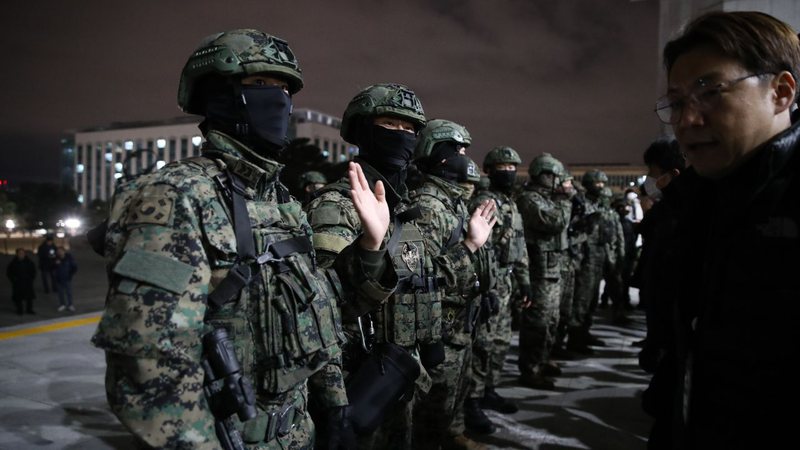Martial Law, an extreme measure reserved for moments of severe crisis, was declared by the President of South Korea on Tuesday, December 3, 2024. The government justified the decision by claiming that opposition groups were promoting actions that constitute “clear anti-state behavior aimed at inciting rebellion.” This decision placed the country under temporary military rule, a measure with profound implications for civilian life and political order.
This episode rekindles discussions about the limits and challenges of this legal provision, which, although outlined in the constitutions of many countries, raises controversies regarding its potential for abuse and impacts on fundamental rights.

Martial Law is a legal measure that temporarily transfers civil authority to military commands, usually in situations of war, severe political crises, or large-scale natural disasters. During its enforcement, fundamental rights, such as freedom of speech, assembly, protest, and even due process, may be suspended.
The Brazilian Chamber of Deputies’ website defines it as a regime that “subjects all people to a special regime during a state of war, with the suspension of civil and political guarantees normally assured by constitutional laws in peacetime.” This definition highlights the exceptional and restrictive nature of the measure, which prioritizes national security and stability over certain individual freedoms.
According to jurist Camilo Onoda Caldas, a specialist in Democracy and Human Rights, Martial Law is a legal tool provided in various constitutions but should only be used in extreme situations. “Its purpose is to guarantee the internal order of the country. However, this does not mean that authorities can act without limits. Abuses must be punished, and an essential part of citizens’ rights remains inviolable,” he explains.
In South Korea, the Martial Law decree was detailed in an official statement signed by General Park An-su, commander of the operation. The decree imposes a series of restrictions and drastic changes, including:
- Suspension of political activities: Meetings of the National Assembly, local councils, political parties, and associations are prohibited. Any form of rally, protest, or public demonstration is immediately banned.
- Media control: All media outlets and publications are placed under military supervision. Information deemed as “false news” or “manipulation of public opinion” may be censored.
- Strike prohibition: Doctors and other professionals on strike have been called to return to work within 48 hours. Non-compliance will result in severe sanctions under Martial Law.
- Suppression of subversive activities: Actions interpreted as attempts to overthrow the liberal democratic regime are subject to immediate repression, including arrests without warrants, as provided by Article 9 of the country’s Martial Law.
- Measures for ordinary citizens: Despite the restrictions, the decree specifies that the general population should be minimally affected, except for those deemed “anti-state forces.”
According to the government, these measures are essential to “protect the liberal democracy of the Republic of Korea and the safety of its people.”
Martial Law is not a new phenomenon in international political history and has been declared at various points in history. During the outbreak of the Russia-Ukraine war in 2022, both countries implemented martial regimes to handle the instability. However, older examples, such as the regime imposed by Ferdinand Marcos in the Philippines in 1972, illustrate the risks of abusing this power, often resulting in prolonged repression and authoritarianism.
In South Korea, the history of authoritarian regimes, such as those in the 1980s, strengthens concerns from international organizations and human rights groups. They fear that the decree could be used to silence opposition and limit democratic freedoms.
Since the declaration of Martial Law, the situation in South Korea has been closely monitored by governments and international organizations. The decision has already sparked protests from activists and criticism from foreign leaders, who point to possible human rights violations and the risk of democratic backsliding.
Experts warn of the challenges of balancing the need for national security with the preservation of fundamental rights. While the measure is provided for in the legislation and has been implemented under the justification of security, its extent and duration will be determining factors in assessing its impact on South Korean society and regional stability.
The declaration of Martial Law in South Korea marks a significant moment in the country’s current political landscape, representing an attempt by the government to contain internal crises that it considers threatening to public order and the democratic regime. However, the application of this measure raises deep debates about the limits of state power and the risks associated with the suspension of civil rights.
The unfolding of this situation will serve as an important case study to understand the impacts of Martial Law in the modern context, both in terms of its effectiveness in maintaining order and its possible consequences for democratic freedoms and human rights.
The declaration of Martial Law in South Korea serves as a stark reminder of the delicate balance between national security and the preservation of democratic freedoms. While the measure may be justified in times of crisis, its application must be accompanied by extreme caution and transparency to avoid abuses of power and human rights violations.
The international community will continue to closely monitor developments in the country, especially the impact of Martial Law on political stability and the well-being of the population. For many, the true test of a democratic government lies not only in its ability to face crises but also in how it preserves the fundamental values of liberty, justice, and dignity, even in the most challenging moments.
In this context, South Korea’s management of this situation will be crucial not only for its internal future but also as a precedent that may shape how other countries deal with similar emergencies. History will teach whether this was a necessary act to protect democracy or a dangerous precedent for authoritarianism in one of Asia’s most vibrant democracies.

